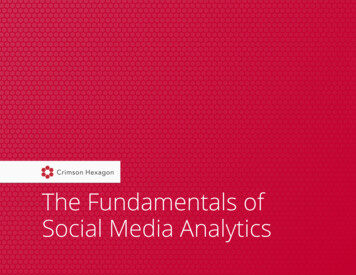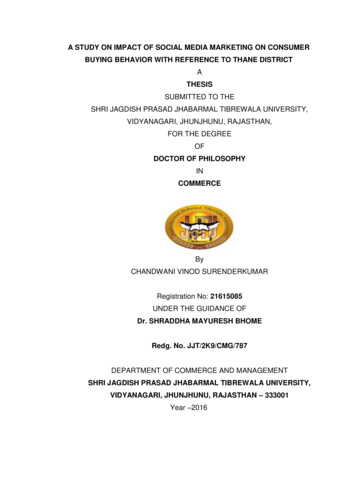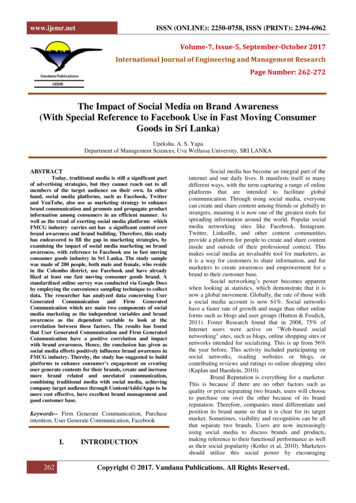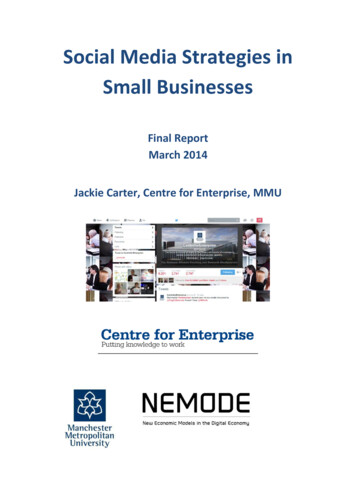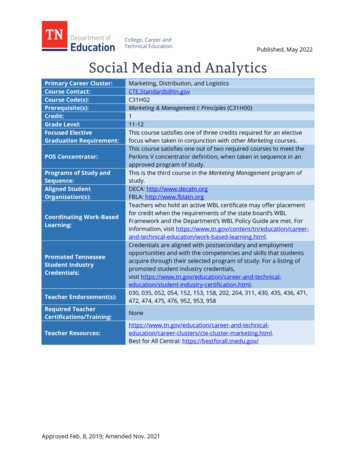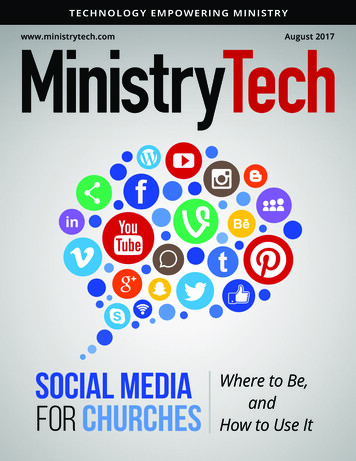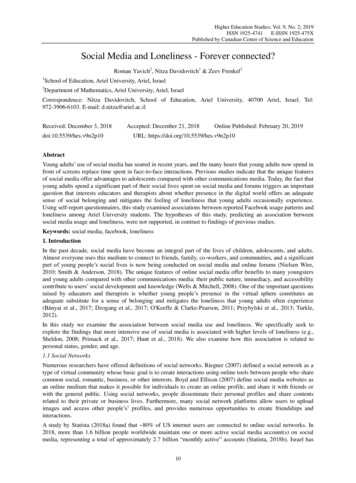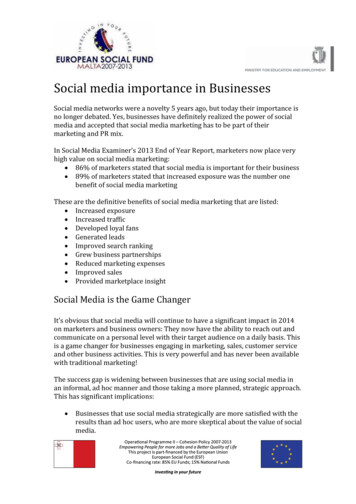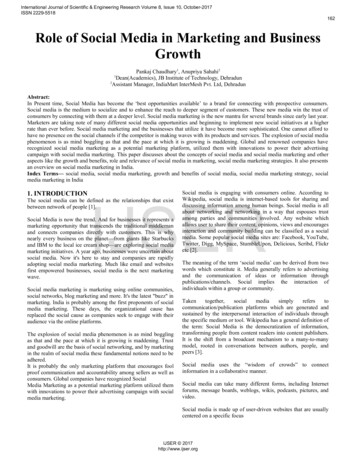
Transcription
International Journal of Scientific & Engineering Research Volume 8, Issue 10, October-2017ISSN 2229-5518162Role of Social Media in Marketing and BusinessGrowthPankaj Chaudhary1, Anupriya Sahahi2Dean(Academics), JB Institute of Technology, Dehradun2Assistant Manager, IndiaMart InterMesh Pvt. Ltd, Dehradun1Abstract:In Present time, Social Media has become the ‘best opportunities available’ to a brand for connecting with prospective consumers.Social media is the medium to socialize and to enhance the reach to deeper segment of customers. These new media win the trust ofconsumers by connecting with them at a deeper level. Social media marketing is the new mantra for several brands since early last year.Marketers are taking note of many different social media opportunities and beginning to implement new social initiatives at a higherrate than ever before. Social media marketing and the businesses that utilize it have become more sophisticated. One cannot afford tohave no presence on the social channels if the competitor is making waves with its products and services. The explosion of social mediaphenomenon is as mind boggling as that and the pace at which it is growing is maddening. Global and renowned companies haverecognized social media marketing as a potential marketing platform, utilized them with innovations to power their advertisingcampaign with social media marketing. This paper discusses about the concepts of social media and social media marketing and otheraspects like the growth and benefits, role and relevance of social media in marketing, social media marketing strategies. It also presentsan overview on social media marketing in India.Index Terms— social media, social media marketing, growth and benefits of social media, social media marketing strategy, socialmedia marketing in India1. INTRODUCTIONIJSERThe social media can be defined as the relationships that existbetween network of people [1].Social Media is now the trend. And for businesses it represents amarketing opportunity that transcends the traditional middlemanand connects companies directly with customers. This is whynearly every business on the planet—from giants like Starbucksand IBM to the local ice cream shop—are exploring social mediamarketing initiatives. A year ago, businesses were uncertain aboutsocial media. Now it's here to stay and companies are rapidlyadopting social media marketing. Much like email and websitesfirst empowered businesses, social media is the next marketingwave.Social media marketing is marketing using online communities,social networks, blog marketing and more. It's the latest "buzz" inmarketing. India is probably among the first proponents of socialmedia marketing. These days, the organizational cause hasreplaced the social cause as companies seek to engage with theiraudience via the online platforms.The explosion of social media phenomenon is as mind bogglingas that and the pace at which it is growing is maddening. Trustand goodwill are the basis of social networking, and by marketingin the realm of social media these fundamental notions need to beadhered.It is probably the only marketing platform that encourages foolproof communication and accountability among sellers as well asconsumers. Global companies have recognized SocialMedia Marketing as a potential marketing platform utilized themwith innovations to power their advertising campaign with socialmedia marketing.Social media is engaging with consumers online. According toWikipedia, social media is internet-based tools for sharing anddiscussing information among human beings. Social media is allabout networking and networking in a way that espouses trustamong parties and communities involved. Any website whichallows user to share their content, opinions, views and encouragesinteraction and community building can be classified as a socialmedia. Some popular social media sites are: Facebook, YouTube,Twitter, Digg, MySpace, StumbleUpon, Delicious, Scribd, Flickretc [2].The meaning of the term ‘social media’ can be derived from twowords which constitute it. Media generally refers to advertisingand the communication of ideas or information throughpublications/channels. Social implies the interaction ofindividuals within a group or ommunication/publication platforms which are generated andsustained by the interpersonal interaction of individuals throughthe specific medium or tool. Wikipedia has a general definition ofthe term: Social Media is the democratization of information,transforming people from content readers into content publishers.It is the shift from a broadcast mechanism to a many-to-manymodel, rooted in conversations between authors, people, andpeers [3].Social media uses the “wisdom of crowds” to connectinformation in a collaborative manner.Social media can take many different forms, including Internetforums, message boards, weblogs, wikis, podcasts, pictures, andvideo.Social media is made up of user-driven websites that are usuallycentered on a specific focusIJSER 2017http://www.ijser.org
International Journal of Scientific & Engineering Research Volume 8, Issue 10, October-2017ISSN 2229-5518(Digg news) or feature (del.icio.us bookmarking). Sometimes,the community itself is the main attraction (Facebook andMyspace networking)Social media are media for social interaction, using highlyaccessible and scalable publishing techniques. Social media usesweb-based technologies to turn communication into interactivedialogues. Andreas Kaplan and Michael Haenlein define socialmedia as "a group of Internet based applications that build on theideological and technological foundations of Web 2.0, whichallows the creation and exchange of user-generated content."Social media is the medium to socialize. They use web-basedtechnology to quickly disseminate knowledge and information toa huge number of users. They allow creation and exchange ofuser-generated content. Facebook, Twitter, Hi5, Orkut and othersocial networking sites are collectively referred social media [6].Social media represents low-cost tools that are used to combinetechnology and social interaction with the use of words. Thesetools are typically internet or mobile based like Twitter,Facebook, MySpace and YouTube.There are two benefits of social media that are important tobusinesses, they include:163as the catalyst for social media’s rapid popularity. The studyresults show that social media usage by small business ownersincreased from 12% to 24% in just the last year, and almost 1 outof 5, actively uses social media as part of his or her marketingstrategy [6].In 2009, only 23% of marketers were using social media foryears. Now that number has grown to 31%.Here’s a breakdown of what the small businesses reported as themain uses of social media marketing: 75% have a company page on a social networking site. 69% post status updates or articles of interest on socialmedia sites. 57% build a network through a site such as LinkedIn. 54% monitor feedback about the business. 39% maintain a blog. 26% tweet about areas of expertise. 16% use Twitter as a service channel.According to the study, different industries are adopting socialmedia marketing at different rates, and while many industrieshave started using social media marketing in their efforts to reachmore customers, many still have not positioned it as their toppriority.IJSER1. Cost reduction by decreasing staff time.2. Increase of probability of revenue generation.Social media enables companies to:· Share their expertise and knowledge.· Tap into the wisdom of their consumers.· Enables customers helping customers.· Engages prospects through customer evangelism.A research shows that charitable organizations are still outpacingthe business world and academia in their use of social media. In astudy conducted in 2008, a remarkable eighty-nine percent ofcharitable organizations are using some form of social mediaincluding blogs, podcasts, message boards, social networking,video blogging and wikis [2].Thus the benefits of social media include: brand reach andawareness, consumer interactions through transactions, referralsand reputation management [3].2. SOCIAL MEDIA MARKETINGSocial media marketing consists of the attempt to use socialmedia to persuade consumers that one's company, products and/orservices are worthwhile. Social media marketing is marketingusing online communities, social networks, blog marketing andmore [6].Lazer and Kelly’s (1973) define social marketing as "concernedwith the application of marketing knowledge, concepts, andtechniques to enhance social as well as economic ends. It is alsoconcerned with the analysis of the social consequences ofmarketing policies, decisions andactivities."Social media marketing is not merely about hitting the frontpageof Digg or any other social news website. It is a strategic andmethodical process to establish the company’s influence,reputation and brand within communities of potential customers,readers or supporters.3 GROWTH OF SOCIAL MEDIA MARKETINGA recent study, “The State of Small Business Report,” sponsoredby Network Solutions, LLC and the University of Maryland’sRobert H. Smith School of Business, points to economic strugglesA majority (57%) of the organizations are blogging. Forty-fivepercent of those studied report social media is very important totheir fundraising strategy. While these organizations are bestknown for their nonprofit status and their fundraising campaigns,they demonstrate an acute, and still growing, awareness of theimportance of Web 2.0 strategies in meeting their objectives.In just the last few months, marketers have shifted their attitudestoward social media marketing spending. This was recentlyaffirmed in the new study, “The CMO Survey”, from DukeUniversity’s Fuqua School of Business and the AmericanMarketing Association [7].4 A KEY FINDINGSocial media marketing budgets continue to rise. According to theresults, businesses currently allocate 6% of their marketingbudgets to social media, an allotment they expect to increase to10% during the next year and 18% over the next 5 years.Back in August 2009, marketers had already planned on devotingmore money to social media.However, in February 2014, marketers reported that they plan toallocate one-fifth of their marketing budgets to social mediamarketing in the next 5 years [3].This is a definite increase from the 2009 projections. The studyfeatures the following comparison from August 2009 to February2014:IJSER 2017http://www.ijser.org
International Journal of Scientific & Engineering Research Volume 8, Issue 10, October-2017ISSN 2229-5518It can be understood that even though many are stillexperimenting and learning how best to use social media tools,these results indicate that marketers think social media marketingis here to stay and will play an increasingly important role in theirwork in acquiring and retaining customers in the future [5].5 BENEFITS OF SOCIAL MEDIA MARKETINGSignificantly different from conventional marketing strategies,Social Media Marketing (SMM) offers three distinct advantages.One, it provides a window to marketers to not only presentproducts / services to customers but also to listen to customers’grievances and suggestions.Two, it makes it easy for marketers to identify various peergroups or influencers among various groups, who in turn canbecome brand evangelist and help in organic growth of a brand.And, three, all this is done at nearly zero cost (as compared toconventional customer outreach programmes) as most of thesocial networking sites are free [2].Social media marketing helps in: Generating exposure to businesses. Increasing traffic/subscribers. Building new business partnerships. Rise in search engine rankings. Generating qualified leads due to better leadgeneration efforts. Selling more products and services. Reduction in overall marketing expenses. Companies in the west are investing increasingly inSMM to get in touch with their customers.164significant 81% of marketers plan on increasing their use of blogs[6].A majority of the marketers are employing social media formarketing purposes and small businesses were slightly morelikely to use social media. 76% of marketers are spending atleast 4 hours each week on their social media marketing efforts[4].In the present context, it is increasingly becoming pertinent forcompanies to(1) build a favorable base of consumers, and(2) involve them in decision making.According to Softpedia, during the last quarter of 2009, 86percent of online retailers in US had a Facebook page. It wasexpected that this figure would reach 99 percent very soon.During this same period, e-marketer pointed that 65 percent of itssurveyed online retailers were active on Twitter. Another 26percent were planning to incorporate Twitter in their plans. Emarketer projects that by 2018, 99 percent of online retailers willbe Twitter ready and all of them will have a Facebook page.Presently, greater than 700 thousands businesses have an activeFacebook page. And around 80 thousand web portals areFacebook Connected presently.IJSERSocial media gives marketers a voice and a way to communicatewith peers, customers and potential consumers. It personalizes the"brand" and helps you to spread the message in a relaxed andconversational way.They are indulging in constant interaction with their prospects inorder to understand their needs and hence make products better.It’s the best way to learn from your customers about their needsand your own shortcomings.Adult beverage companies, exotic automobile manufacturers,pastry shops have been using social media tool. Pepsi Coke,Nokia and many of the top brands have effectively used socialmedia for achieving their business objectives.However, SMM is a very personalized way of advertising andpromotions can be targeted only to particular groups which areinterested in a particular domain, quite unlike conventionaladvertising [4].Few companies that have become involved in social media are:6 UNDERSTANDING THE RELEVANCE OFSOCIAL MEDIA IN MARKETINGThe role of social media in marketing is to use it as acommunication tool that makes the companies accessible to thoseinterested in their product and makes them visible to those thatdon't know their product. It should be used as a tool that creates apersonality behind their brand and creates relationships that theyotherwise may never gain. This creates not only repeat-buyers,but customer loyalty. Fact is social media is so diversified that itcan be used in whatever way best suits the interest and the needsof the business.According to 2014 Social Media Marketing Industry Report2014, a majority of marketers (76%) are using social media for 6hours or more each week, and nearly one in three invest 11 ormore hours weekly. Twitter, Facebook, LinkedIn and blogs werethe top four social media tools used by marketers, in order. AAbsolut Vodka - Online Video on YouTube and Using Facebookto house their Top Bartender fan page.BMW - Utilizing Facebook to promote their 1-Series Road Tripand they have created a Rampenfest Page for fans.Dunkin Donuts - They've found value in social media and haveset up a microblogging Twitter account.General Motors - GM leverages the social media to improve theonline equity of its brand and make consumers feel moreconnected.Until recent past, social media effectively served as anothercustomer outreach activity of organizations – essentially buildingbrand awareness and generating leads. However, trends are nowchanging towards utilizing social media for positively impactingsales. A mindset shift towards making social media a committedengagement channel is already underway.An analysis by Wetpaint and Altimeter – engagementdb.com,concurs that the most successful companies on social platformswere maintaining profiles on 7 or more channels [4].IJSER 2017http://www.ijser.org
International Journal of Scientific & Engineering Research Volume 8, Issue 10, October-2017ISSN 2229-55187 THE PERVASIVENESS OF SOCIAL MEDIASocial media is no more a fancy term; its popularity can bededuced from the findings of the latest PEW Research – as muchas 70 percent of the economically active population is wellentrenched in to the social media space. Similar statistics, albeitfrom a different source eMarketer, further corroborates thisnotion; 46 percent of people in age group of 44 – 62 yearsand around 61 percent under category 27 to 43 years are sociallynetworked.8 ROLE OF SOCIAL MEDIA IN MARKETINGSocial media is now increasingly becoming an ingrained aspect ofpolitical campaigns, national defense strategies, public policy,public relations, brand management and even intra companycommunication.Since the major task of marketing as tool used to informconsumers about the company’s products, who they are and whatthey offer, social marketing plays an important role inmarketing.· Social media can be used to provide an identity about thecompanies and the products or services that they offer.· Social media helps in creating relationships with people whomight not otherwise know about the products or service or whatthe companies represent [4].· Social media makes companies "real" to consumers. If theywant people to follow them they need not just talk about the latestproduct news, but share their personality with them.· Social media can be used to associate themselves with theirpeers that may be serving the same target market.· Social media can be used to communicate and provide theinteraction that consumers look for.165· Branding: Buying a candy may have been impulsive all yourlife, but if it is discussed on a social networking site, there islikely to get brand conscious even a candy. Social media is asmart way to build brands. Social media platforms are known tobe one of the most powerful and fast means of branding. Some ofthe big brands like Coke, Ford, Dell, IBM, Burger King are someof the well known brands have powerfully used social mediaplatforms to endorse themselves.10. BARRIERS TO IMPLEMENTATION OFSOCIAL MEDIA AT COMPANIESOn the other hand, social media use scenario is more encouragingat small businesses.According to the State of Small Business Report, social mediausage by small businesses increased from 12 percent to 24percent in the last year. Further, almost 20 percent of smallBusinesses actively employ social media as an integral part of themarketing strategy.In fact small businesses are currently allocating 6% of theirmarketing budgets to social media. It is expected that this isexpected to reach 10 percent by 2011 and further to around 18percent over the next 5 years. Some of the findings from thesurvey are particularly encouraging from business via socialmedia point of view, these include:· 75 percent of small businesses have presence on a socialnetworking site· 54 percent are monitoring feedbacks· 69 percent post updates or interesting articles on social mediasites [4].IJSER9 WHY BUSINESSES NEED TO CONSIDERSOCIAL MEDIA MARKETING SERVICES· Size: Facebook has over 250 million users globally. On anaverage, 70-100 tweets happen by the second. An average user onFacebook has 120 friends. This is the kind of enormity Socialnetworking sites espouse and with this comes the license tocommunicate powerfully. But when such large numbers areinvolved, there is a danger of something going wrong and when itdoes, it happens in a big way. An expert should be hired to dowhat is best for business [3].· Transparency: No cheat code involved. No black hattechniques allowed. Everything that happens in the socialnetworking landscape is fool proof. Companies cannot fakeauthenticity in an attempt to get more people involved. Memberscan choose to associate with the company or opt out. Opinionsmade on social networking platforms are taken seriously and themore authoritative the companies get, more seriously they aretaken [3].· Reach: It is possible to make mark globally and do it quicklyusing social networking sites.· Boost website traffic: Social media is probably the fastest andeasiest means of redirecting traffic to company’s website. Bysimply placing their website URL in their profile, the companycan have all their profile visitors check out their website and apercentage of traffic is sure to get converted in course of time.This is the virtual way version of “word-of mouth” [5].Those are some mind boggling numbers, especially after theviewing the depth of social media penetration across bigcompanies. But what is most striking from the two surveys is thefact tha while nearly 70 percent of Fortune 100 companies arevirtually inactive. However, a similar percentage of smallbusinesses are buzzing with activity on social media. Nonethelessstatistics aside, it is high time, that businesses, irrespective oftheir size have a social media plan that has3 C’s in it, viz(1) a Companywide engagement strategy that(2) ensures Conversations withconsumers, and(3) Causes user loyalty across social networks.11 SOCIAL MEDIA MARKETING IN INDIA AN OVERVIEWIndia has 71 million active internet users. Social Media is reallypicking up new heights in India. According to the 2010 RegusGlobal Survey of business social networking, India tops the usageof social networking by business – it has the highest activityindex, 127, far more than the US’97, and 52% of the Indianrespondent companies said that they had acquired newcustomers using social networks while 35% American companiesmanaged that. Many companies are coming big way for SocialMedia Optimization for their Product or Services nowadays.During Election 2009 Social Media was used for Influence IndianVoters. Social Media Marketing in India is being undertaken bybrands like Tata Docomo, MTV India, Channel V, Clear Trip,Tata Photon, Axe deodorants, Microsoft, Naukri, Shaadi andmany more. Besides, numerous Indian celebrities are also usingSMM platform to promote their movies, music and events viaIJSER 2017http://www.ijser.org
International Journal of Scientific & Engineering Research Volume 8, Issue 10, October-2017ISSN 2229-5518166Twitter, Facebook and personalized blogs. Social MediaMarketing is also boostingpublic relations business. Several PR agencies in India areundertaking brand building exercises for corporate organizations,brands and celebrities. However, to the delight of many amongus, the biggest gainers from SMM till date have been theorganizations from the Not-for-Profit sector. Several Campaignslike ‘Bell Bajao’ and ‘Jaago Re’ have been quite successful onSocial Networking Sites [3]. These campaigns have beenspreading the word about their cause through blogs, Twitter andFacebook.bookmarking sites such as Digg or StumbleUpon, and check onwho is linking to your site to find out who’s interested [4].12. SOCIAL MEDIA MARKETINGSTRATEGIES· The company shouldn’t just jump on to the bandwagon justbecause others are jumping into it. The market should be analyzedfirst to understand whether their brand would really benefit fromSMM. It should try and find out whether SMM strategies fit itsbrand [4].SMM is still in its infancy. Most of the online retailers thoughappreciate its positives fallouts on the brand awareness andpromotion; they are still in the early stages of adoption. For anorganization willing to invest in social media marketing, it isimportant to understand why SMM is an important marketingstrategy and how it can help:· This is the age of consumer satisfaction. It is not about selling itis more about interacting. There is a lot to learn from thecustomers. Using social media one can identify customers, listento their feedback and use them to improve and innovate onproducts or services.Social media gives businesses on small budgets the ability to findout what people are saying about them (and others) in theirindustry, without paying large sums on market research. With it’sear to the ground on social media, the company will be the first toknow if its product is working or if changes need to be made.To successfully implement one’s SMM strategy the followingpoints must be kept in mind:· The company shouldn’t expect results over night. SMM is along term strategy. It will not happen overnight. The results mightbecome visible anywhere from three to six months.· SMM is not a standalone tool for marketing. It has to be usedalong with all the other conventional marketing strategies.IJSER· SMM is not a mass advertising strategy. It can be used toidentify peer groups and advertise to that particular group. SocialMedia can help in identifying influencers and through them onecan guide a prospective customer into making a purchase.There are many things that social media can do for business.Developing a strategy for using it means that the firms need tothink about what they want to accomplish this year and determinehow social media fits into the plan. One of the benefits of a socialmedia strategy is the fact that the available tools can customizedfor their particular needs [5].· SMM calls for novel advertising methods as the attention spanof online junta is very low. This is largely due to the multitaskingphenomena. A person watching a video clip onYouTube might be simultaneously updating a blog, while readinganother one and watching friend’s photographs on Facebook.The firms can choose to concentrate their efforts on the sites thatseem to offer the best return on investment, while taking a “waitand see” stand on the others [4].In order to garner their attention away from distractions theadvertisement must be innovative and interesting to hold theimagination and attention of the prospect.There is no escaping social media these days, either forindividuals or for businesses. Today, it is impossible to separatesocial media from the online world. The social mediaconversation is no longer considered a Web 2.0 fad -- it is takingplace in homes, small businesses and corporate boardrooms, andextending its reach into the nonprofit, education and healthsectors. From feeling excitement, novelty, bewilderment, andoverwhelmed, a growing number of people now speak of socialmedia as simply another channel or tactic.· At the same time the message must also provoke the recipientinto action; like seeking a detailed description of theproduct/service, or suggesting to a friend, or initiating purchase.So, if the advertisement is trying to sell something then it shouldbe conveniently placed with links so that the prospect can make apurchase with least effort [6].Similarly Social Media can be used to increase customer loyaltythrough customer support services and hence improve customerretention.· Social Media Marketing can also be used by brands to ward offany negative publicity. But the brands will have to be cautioushere as over doing it may further aggravate theircustomers / stakeholders. Companies using traditional marketingmethods (e.g. surveys, focus groups, test marketing)often spend millions to locate their target markets. Establishing asocial media strategy will help them see where potentialcustomers are hanging out. The companies can search for relatedgroups and Fan Pages through Facebook, start accounts on social13 CONCLUSIONBlogging can have a very positive effect on your Company’sbranding & growth. As per the Hubspot report, Customers withblogs gathered 68% more leads than customers without blogs. Itis imperative to understand that today, social media haveexponential potential.They are part of an ever-growing online network of people whodiscuss, comment, participate, share and create.Whether you are an individual, a startup, small business or a largecorporation, an online presence and an ongoing conversation withyour constituents is a baseline requirement – and will take timeand expertise. Companies are diverting resources and rethinkingtheir traditional outreach strategies. And as the social media waveIJSER 2017http://www.ijser.org
International Journal of Scientific & Engineering Research Volume 8, Issue 10, October-2017ISSN 2229-5518dissipates into the vast ocean of connected experiences, the termitself will become an entry in dictionaries and encyclopedias andwe will embark on a new era of knowledge, accessibility andexperiences unbound by distance, time or physical walls. It ishigh time that every business adopts social media and takes itseriously!14 REFERENCES[1] Kaplan, Andreas M.; Michael Haenlein (2010). "Users of the world, unite!The challenges and opportunities of Social Media". Business Horizons53(1):59–68. doi:10.1016/j.bushor.2009.09.003. ISSN 12e1. Retrieved 2010-09-15.[2] Lazer, W., Kelley, E.J. (1973). Social Marketing: Perspectives andViewpoints. Homewood: Richard D. Irwin[3] Michael A. Stelzner (2010), Social Media Marketing Industry Report,“How Marketers are using social media to grow their businesses”, SocialMedia Examiner, April 2010[4] Nora Ganim Barnes, Eric Mattson, “Still Setting the Pace in Social Media:The First Longitudinal Study of Usage by the Largest US Charities”,University of Massachusetts Dartmouth Center for Marketing Research, 2008[5] Social Media in India – An Overview by techiedevil on June 11, 2010 inSocial Media ng/[7] ement-on-social-media-industryperspective/[9] SER 2017http://www.ijser.org167
using online communities, social networks, blog marketing and more [6]. Lazer and Kelly's (1973) define social marketing as "concerned with the application of marketing knowledge, concepts, and techniques to enhance social as well as economic ends. It is also concerned with the analysis of the social consequences of marketing policies .
